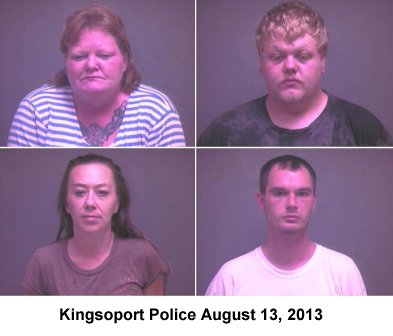Search Warrant Nets Four Arrests

On August 13, 2013, at approximately 8:30 P.M., Kingsport Police Department (K.P.D.) Vice Detectives executed a search warrant at 544 Virgil Avenue, Kingsport, Tennessee, following an ongoing investigation. The raid resulted in the arrest of four individuals, including a mother and son living at the residence and two nearby visitors. The operation uncovered a range of drug-related offenses, spotlighting how drug activity often clusters within families and social circles in the region.
Amelia G. Dugger, the homeowner, was charged with Possession of Schedule II Drugs (Oxycodone) for Resale and TennCare Fraud, the latter stemming from evidence she sold pills obtained through TennCare benefits. Already on probation for a prior drug resale charge, her arrest compounded existing legal woes. Her son, Charles R. Dugger, also a resident, faced charges for Possession of Unlawful Drug Paraphernalia after a marijuana pipe was found. Visitors Tenaya M. Fields and Brandon A. Bledsoe, from the neighborhood, were arrested for Possession of a Legend Drug (muscle relaxer) without a Prescription and Possession of Schedule III Drugs (Hydrocodone), respectively. Fields also had an outstanding warrant from another agency.
Drug Arrests and Family Entanglement in East Tennessee
In East Tennessee, drug arrests like this one frequently ensnare entire families, a pattern driven by limited job prospects and scarce treatment options. Sullivan County, home to Kingsport, has long struggled with economic decline—coal and manufacturing jobs dwindled by 2013, leaving a 7.8% unemployment rate (Bureau of Labor Statistics, 2013) and few pathways out of poverty. For families like the Duggers, prescription drug abuse, often starting with legitimate pain management, spirals into resale schemes, as seen with Amelia’s oxycodone and TennCare fraud. Charles’s marijuana use suggests a household where drug activity is normalized, pulling multiple generations into the legal net.
The region’s treatment landscape exacerbates this cycle. In 2013, Tennessee ranked near the bottom nationally for substance abuse treatment access, with rural areas like Sullivan County offering fewer than 10 licensed facilities countywide (SAMHSA data). Long waitlists and high costs—unaffordable on median incomes of ~$35,000—leave addiction untreated, fostering environments where neighbors like Fields and Bledsoe join in, as seen here. Your prior pages show this trend: the 2014 Bowen family meth lab (Virgil Avenue again) endangered kids, while Bristol’s 48-arrest bust in 2014 included relatives, reflecting how drug networks thrive in tight-knit, resource-starved communities.
With jobs scarce—retail and service roles dominate—and treatment out of reach, families turn to dealing or using to cope, only to face mass arrests when police intervene. The Duggers’ case, netting a mother, son, and visitors in one swoop, mirrors countless others: entire households collapse under drug charges, leaving courts and jails as the region’s de facto response, not rehabilitation or economic uplift.
Source: Kingsport Police Department, August 13, 2013.

